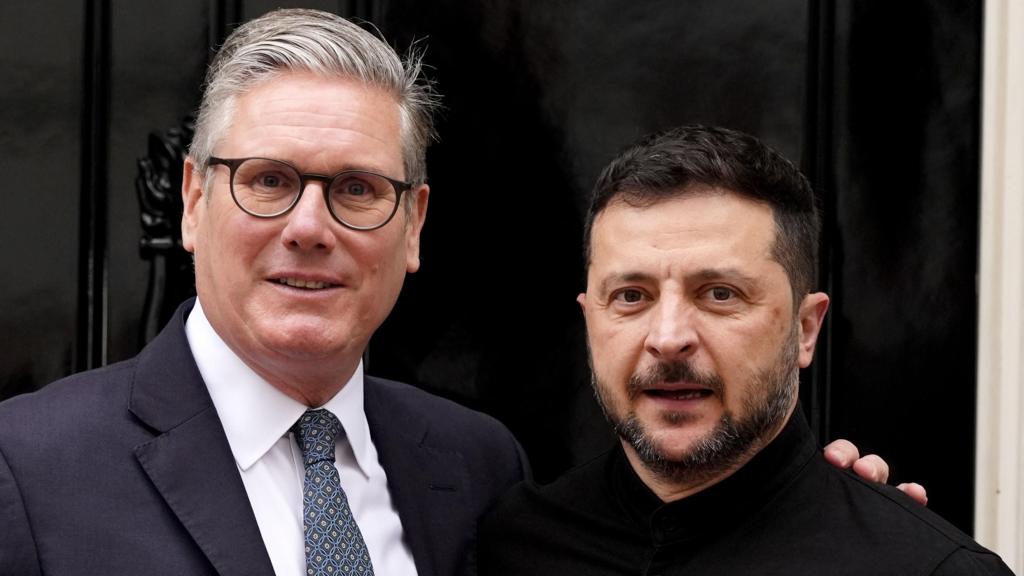Sir Keir Starmer’s public statements on a potential Ukrainian peace process appear to diverge from his privately held, more pragmatic perspectives.
A consistent element remains the Prime Minister’s continued condemnation of Russia’s President Putin and unwavering support for President Zelensky.
Some analysts suggest that Starmer’s approach is judicious when navigating intricate negotiations involving unpredictable global leaders.
Westminster experienced palpable unease surrounding Friday’s meeting in Alaska between Presidents Putin and Trump.
However, UK ministers maintained a diplomatic stance, eschewing the forceful rhetoric characteristic of former PM Boris Johnson.
He previously described that meeting as “the most vomit-inducing episode in all the tawdry history of international diplomacy”.
While not explicitly stated by Sir Keir, sources indicate the UK government privately acknowledges the “land for peace” concept—Ukraine ceding territory as a component of a peace agreement with Russia.
This may involve only territory currently under Russian military control, but it nonetheless signifies a challenging path forward for Kyiv.
Downing Street sources emphasize, however, that territorial considerations ultimately rest with Ukraine, and Ukraine alone.
“There are three issues,” a British official stated, “the extent of land, the specific land in question, and whether the transfer is de facto or de jure.”
This final point alludes to a potential ambiguity in negotiations. Ukraine might accept land as “de facto” Russian territory due to Moscow’s military control, or it could be recognized as Russian “de jure” and internationally legally sanctioned.
Sources suggest the UK government has two primary objectives for today’s assembly of leaders at the White House.
Firstly, to encourage President Zelensky to carefully consider Donald Trump’s proposals. The memory of February’s Oval Office dispute remains fresh, and all parties are keen to prevent a recurrence.
Secondly, Keir Starmer and his European counterparts aim to elaborate on the details of what they hope will be “ironclad” security guarantees – measures to safeguard and defend Ukraine should a peace accord be reached.
Trump envoy Steve Witkoff’s recent endorsement of these proposed security guarantees as “game changing” is viewed by Downing Street as validation that months of work on Starmer and Macron’s ‘coalition of the willing’ is yielding positive results.
UK government sources highlight that many had dismissed this endeavor as irrelevant or unattainable, yet the opposite is now evident.
Sir Keir’s role at the White House today will likely leverage his unique position of having strong relationships with both Trump and Zelensky. The Prime Minister appears committed to continuing his role as a diplomatic “bridge” between the White House and European leaders.
As he departed for Washington DC on Monday morning, the Prime Minister stated in a video posted on X: “Everyone desires an end to this conflict, especially the Ukrainians.
“However, we must ensure we get this right. We must strive for a peace that is lasting, fair, and just.”
But what specific contribution will Donald Trump make?
Witkoff has suggested that the “United States could offer Article 5-like protection,” referencing the section of NATO’s treaty outlining the principle of collective defense.
Zelensky has hailed this as “a historic decision”.
However, a firm, public commitment from President Trump regarding the US’s role would likely assuage concerns in London, Paris, Berlin, and Rome.
One UK government source characterized President Trump’s role in Ukraine-Russia peace negotiations as an “exercise in raw power.”
UK officials assess that Donald Trump will utilize every available American resource to secure a deal.
Ideally, he would prefer to have Western nations aligned, yet they believe his pursuit of peace outweighs his desire to ensure European leaders are fully satisfied.
Keir Starmer’s strategy appears to be one of support and pragmatism, even if the US president does not share his evident skepticism and animosity toward Vladimir Putin.
Sign up for our Politics Essential newsletter to keep abreast of the inner workings of Westminster and beyond.
The vice president of the Board of Deputies of British Jews described Zarah Sultana’s remarks as “a grave insult”.
As global leaders converge for crucial discussions, what outcomes will they, and others present, deem a success?
European leaders are set to join Zelensky as he participates in pivotal discussions with Trump regarding the Russia-Ukraine conflict.
In a joint letter, politicians have urged the prime minister to exert pressure on Israel to end the war in Gaza.
The Washington meeting holds potential significance for the future of Ukraine and the broader security landscape of Europe.

